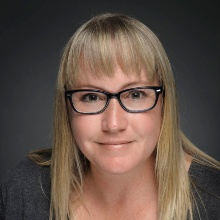Adrienne Phillips from the Montana State University was the second Anneliese Niethammer Lecture Series speaker on May 16. She gave a talk about: "Biofilm-Induced Mineral Precipitation: A Journey from Laboratory to Field".
About her talk
Microbially-induced calcite precipitation (MICP) is researched as an emerging technology for subsurface engineering applications including sealing defects in wellbore cement and modifying the permeability of rock formations [1]. In this presentation, Dr. Phillips will describe the efforts to understand the processes in biofilm-mediated mineral precipitation (a form of biocement) as well as the use of these biocements in the field for remediating leaking oil and gas and carbon sequestration wells. Laboratory reactor systems were used to scale up and develop injection strategies applicable to the field. Reactive transport modeling has been performed at the University of Stuttgart to enhance the design and support the success of the laboratory and field experiments. In a well at the Gorgas Power Plant near Parrish, Alabama, which was drilled as part of the US Department of Energy Carbon Sequestration Program, three field tests have been performed to seal a horizontal “pancake fracture” in tight sandstone [2] and to seal a channel which had formed in compromised wellbore cement both in the presence and absence of CO2[3]. Results presented will include a description of the success at sealing the fracture or formation and the results of the reactive transport modeling [4].
[1] Phillips, AJ et al., Engineered applications of ureolytic biomineralization: a review. Biofouling 2013, 29 (6), 715-733.
[2] Phillips, AJ; et al., Fracture Sealing with Microbially-Induced Calcium Carbonate Precipitation: A Field Study. Environmental Science and Technology, 2016, 50 (7), 4111-4117.
[3] Phillips, AJ, et al., Enhancing wellbore cement integrity with microbially induced calcite precipitation (MICP): a field scale demonstration. Journal of Petroleum Science and Engineering, 2018, Volume 171, Pages 1141-1148
[4] Cunningham, A, et al. Field-scale modeling of microbially induced calcite precipitation, Computational Geosciences (2019) 23:399–414.
About Adrienne Phillips
Dr. Adrienne (Adie) Phillips is an Assistant Professor in the Civil Engineering Department at Montana State University. She is affiliated with the Center for Biofilm Engineering and the Energy Research Institute at MSU. She received her PhD in Engineering in 2013 and an MS in Environmental Engineering in 2003. Prior to her appointment at MSU she worked as an environmental consultant. Dr. Phillip’s research is currently supported by the United States Department of Energy (US DOE) and focuses on the use of microbial biofilms for applications such as remediating leakage from oil and gas or carbon sequestration wells. Recently, Dr. Phillips has been a part of an effort in her department to design and implement a new environmental engineering undergraduate degree. Adie enjoys gardening and hiking in the beautiful Bozeman, Montana area.
More information
Speaker: Adrienne Phillips, Montana State University (USA)
Title: Biofilm-Induced Mineral Precipitation: A Journey from Laboratory to Field
Date: May 16th, 2019
Time: 4 pm
Location: MML, U. 1.003, Pfaffenwaldring 61, Campus Vaihingen
-----------
SFB 1313’s Anneliese Niethammer Lecture Series aims to give women in the science a platform to present their scientific work and intends especially to encourage women to pursue a career in the field of engineering, technology and natural sciences.



